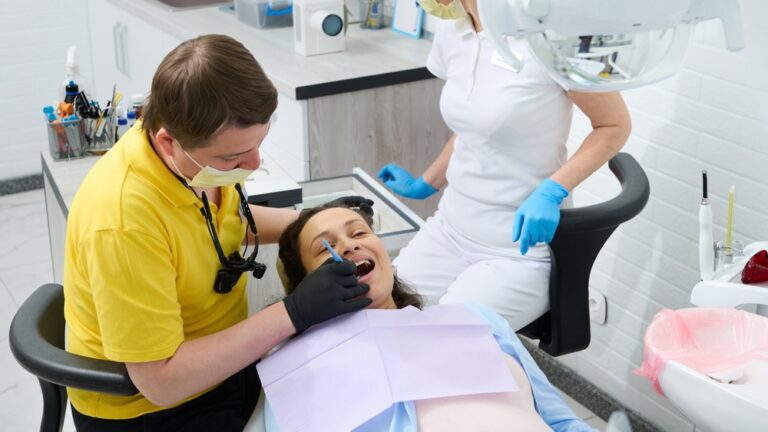Medical Disclaimer: This content is for informational purposes only and does not constitute medical advice, diagnosis, or treatment. Always consult your healthcare provider or qualified dental professional before making changes to your oral care routine during pregnancy.
That bottle of mouthwash on your bathroom counter now comes with new considerations during your pregnancy. Before pregnancy, your oral care routine was simple — swish, spit, done. With your positive pregnancy test, every ingredient label transforms into a thoughtful check of ingredient safety. Most pregnancy guides focus extensively on sushi and soft cheese, while overlooking essentials like the rinse you use twice daily. But is mouthwash safe during pregnancy?
With this guide, you can navigate safe mouthwash choices, establish pregnancy-friendly oral care routines, and protect your health and your baby’s development. Identify the ingredients to include and those to exclude, and establish a routine that accommodates your body’s changes. First, it’s important to know the increased importance of oral care during pregnancy and its outcomes.
Why Oral Health Becomes Essential During Pregnancy
The clear connection between oral health and overall wellness means your daily rinse can contribute directly to a healthier pregnancy. When combined with diligent brushing and professional care, those 60 seconds of swishing do their part to prevent oral complications during pregnancy.
Pregnancy hormones, like estrogen and progesterone, increase blood flow to the gums, causing healthy tissue to swell. The increased blood flow is the ideal place for bacteria to thrive, leading to the risk of gingivitis in many pregnant women. If you notice bleeding gums during your regular brushing routine, discuss your symptoms with a healthcare professional.
Understanding these changes makes it clear why choosing the right mouthwash matters.
Avoid Alcohol-Based Mouthwash During Pregnancy
Research on alcohol-based mouthwash and whether it affects your baby’s development is limited. Because this information is unknown, alcohol-free alternatives are seen as the safer choice for expectant mothers like you.
Alcohol-based mouthwashes may reduce natural moisture from your mouth. Pregnancy already puts extra demands on your oral health through morning sickness, hormonal changes, and fatigue that disrupts your routine. Adding a drying agent adds another layer to your oral care needs. Modern alcohol-free formulas kill germs as effectively while maintaining your mouth’s natural moisture balance.
Let’s take a look at the safest mouthwash options for pregnancy.
What Are The Safest Mouthwash Options During Pregnancy?
Making informed mouthwash choices during pregnancy starts with understanding which ingredients support oral health and your baby’s development. Let’s look at the main benefits of each option to help you make informed choices about which mouthwash is safe during pregnancy.
Choose Alcohol-Free Mouthwash Formulas
Today’s alcohol-free options use advanced antimicrobial ingredients. These formulas are effective, matching traditional rinses in effectiveness while maintaining your mouth’s natural moisture balance.
- Cetylpyridinium chloride (CPC) – destroys bacterial walls while protecting healthy tissue
- Hydrogen peroxide – releases oxygen that eliminates hidden bacteria
- Xylitol – prevents cavity-causing bacteria from adhering to teeth
Discuss specific product choices with your dental care provider to ensure they’re appropriate for your individual needs.
Make Safe Salt Water Rinses at Home
Half a teaspoon of salt in warm water creates a gentle solution that reduces inflammation and supports healing with completely safe ingredients. A saltwater rinse is beneficial after morning sickness while you’re waiting 30 minutes before brushing your teeth. Keeping salt nearby makes it easier to rinse regularly.
Protect Your Teeth with Mouthwash
Morning sickness exposes your tooth enamel to stomach acid. Gentle, non-fluoride mouthwash rebuilds and strengthens enamel that acid has softened. According to the American Dental Association, mouthwash is considered safe during pregnancy when used as directed. Swish for one minute, then spit thoroughly. Wait for 30 minutes before eating.
Consider Prescription Mouthwash When Needed
For advanced gum disease, chlorhexidine mouthwash can significantly reduce the chance of complications during pregnancy. Your dentist will prescribe this when regular mouthwash requires additional support.
Explore Natural Mouthwash Alternatives
Natural mouthwashes use concentrated plant oils in carefully measured dilutions. While most commercial natural rinses contain safe dilutions, look for products specifically labeled pregnancy-safe. Choose products that feel safe and give you confidence.
How you care for your mouth each day makes the most significant impact, beyond just the ingredients you use.
Build Your Complete Pregnancy Oral Care Routine
A recent analysis found that brushing and flossing your teeth daily, with professional cleanings and the right mouthwash, may help support overall maternal health. Oral care is essential for maintaining healthy gums and reducing the risk of inflammation.
Morning sickness is a common experience that requires attentive oral care.
Manage Oral Care During Morning Sickness
When morning sickness happens, protect your teeth with the right timing. Stomach acid temporarily softens enamel to a chalky consistency, so rinsing with water or mouthwash immediately helps neutralize acidity. Wait 30 minutes to allow your saliva to naturally restore enamel strength before brushing. Chewing xylitol gum during this time stimulates protective saliva production, further strengthening your enamel.
Your evening routine is just as important for keeping your mouth healthy.
Establish Your Oral Care Defense Routine
Your dental routine protects your mouth throughout the day. Take the following steps to maximize your dental health:
- Clean between your teeth thoroughly: Removes debris and plaque between teeth; use interproximal brushes, floss, or a water flosser.
- Rinse completely: Reach hidden spaces for 60 seconds.
Combining dental cleaning methods removes particles, eliminates surface bacteria, and ensures oral cleanliness for restorative sleep.
Professional cleanings offer additional protection that regular home care alone can’t provide.
Schedule Professional Dental Care During Pregnancy
Schedule appointments with your dental hygienist for cleanings early in your pregnancy and during the second trimester. These visits ensure professional removal of hardened tartar from your teeth, maintaining optimal oral health during pregnancy beyond what home care can achieve.
At the beginning of your appointment, inform your hygienist that you’re pregnant. They’ll adjust the chair position, product selection, and appointment length to ensure comfort.
Understanding how bacteria can impact your body during pregnancy is an important aspect of good oral care.
Understand Mouthwash Risks During Pregnancy
Research suggests that when gums become inflamed, bacteria may potentially enter the bloodstream and travel throughout the body, including the placental barrier. Your body’s inflammatory response to oral bacteria may affect pregnancy outcomes, making good oral care essential for you and your baby.
Monitoring early changes in your gums can help you proactively address potential issues.
Recognize Early Signs of Pregnancy Gingivitis
Watch for ongoing gum bleeding, tenderness, or changes in breath. A metallic taste in your mouth may signal gum irritation or infection. If you experience any of these symptoms, consult a dental healthcare professional.
Oral bacteria can also affect blood sugar control and blood pressure regulation. Addressing oral health concerns early helps maintain your overall wellness during pregnancy.
Considering this, you can select the mouthwash that best suits your needs.
How To Choose The Right Mouthwash For Your Pregnancy Needs
The most effective mouthwash is one you’ll use consistently throughout your pregnancy. Trust your instincts; if an ingredient concerns you despite safety data, select an alternative that gives you confidence.
Match your mouthwash to your specific needs:
- Gum inflammation: Select antimicrobial formulas
- Healthy teeth: Use simple saltwater rinses
- Morning sickness sensitivity: Opt for unflavored options
- Budget-conscious approach: Create homemade salt solutions
With numerous alternatives available, you can find products that satisfy safety standards and your comfort level.
After selecting your products and establishing your routine, it’s time to implement them.
Take Action for Complete Pregnancy Oral Health
Your pregnancy oral care routine is essential for your health and your baby’s development. Begin with these three steps: Choose an alcohol and fluoride-free mouthwash rinse immediately following episodes of morning sickness, and arrange for a dental cleaning during the second trimester.
Maintaining good oral health during pregnancy may contribute to overall wellness and comfort. Your health is fundamental to your baby’s health, and oral health is a significant aspect of this foundation.
If you have questions, consult your dentist or OB-GYN for personalized recommendations regarding your pregnancy needs and oral health history.
Take the next step in protecting your family’s health through comprehensive oral care. Visit The Dental Medical Convergence to discover essential information that could transform how you approach dental health during pregnancy and beyond.




